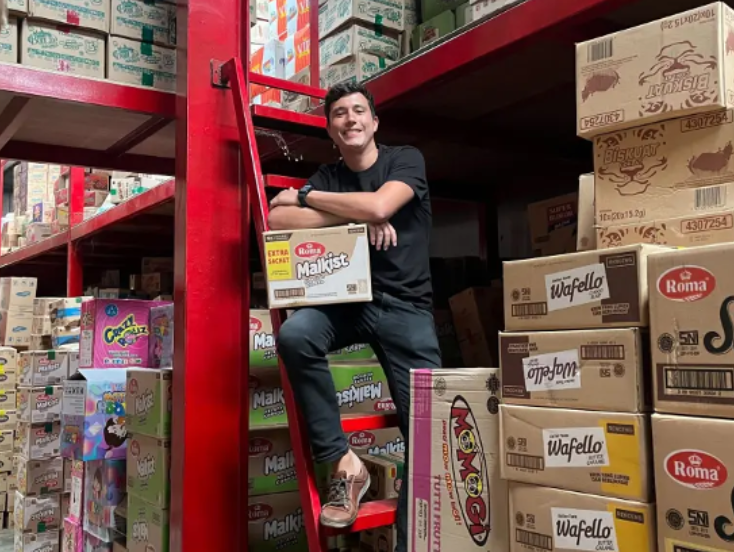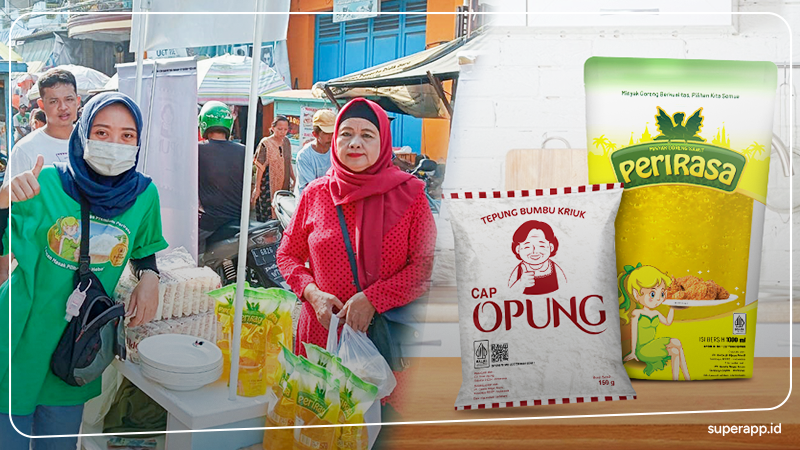Obstacles Continue to Haunt Warung Digitalization Business
Observe Baskit and Super's strategy to handle the fierce search for margins amidst the difficulty of competing in the FMCG supply chain segment
Startup dynamics will continue after the pandemic is over tech winter which causes the founders to have difficulty raising funding. Many white flags were raised because the founders were unable to save their companies after various scenarios were pursued.
One of the phenomena that occurred at that time was the rise in funding for startups eager to digitize food stalls, through digital bookkeeping and supply chains for wholesale food stalls.
Lummo (digital bookkeeping) and Ula (supply chain) are the closest examples which have caused quite a stir since the beginning because they achieved funding in a short time supported by a number of big-name investors. Both are included in the portfolio of Amazon boss, Jeff Bezos, through Bezos Expedition.
In a short time, both of them announced funding with fantastic amounts. Lummo received funding worth IDR 1,14 trillion for series C round in January 2022 within three years of its founding. Meanwhile, the latest funding received by Ula amounting to IDR 1,3 trillion in October 2021, or a year since it was founded in January 2020. Both had time to go through various rescues until finally agreeing to close last year.
In the same year, a startup led by GoTo and Unilever, GoToko stopped operating in May, after only approximately 2,5 years of existence. WarehouseAda There were similar rumors, even though company representatives denied it. This startup received series B funding of IDR 1,4 trillion in July 2021 even though it was only founded in 2019.
Of note DailySocial.id, to the extent that digital bookkeeping startups are relatively viable because they can be combined as additional features. Lummo's closest competitor at that time, BukuWarung for example, has now transformed into a financial application all-in-one to simplify and provide business processes; payment; and access to loans, taking proactive steps to support the financial health of small businesses.
The opposite condition comes from supply chain startups for wholesalers who are considered difficult to survive? Before answering this question, here is a summarized startup mapping DailySocial.id:
| Grocery wholesale startup | |
| As the main solution | Warung Pintar (acquired by Sirclo), Super, GudangAda, Credimart (rebranded to Jooalan), Dagangan, GrosirOne, Baskit (targeting distributor players), Peeba (regional player), Mitra Bukalapak |
| As a complementary solution | Majoo Supplies, Youtap Boss |
| Digital bookkeeping startup | |
| As the main solution | BukuWarung, Credibook |
| As a complementary solution | Fazz Agen (Warung Cashier feature), Moka, Majoo, Youtap, Cashlez, Qasir, Paper.id, Pawoon, iSeller, Olsera |
Build an asset-light business
Warung Pintar once made a report in 2020, stating that more than 75% of the distribution system in the retail supply chain is still conventional with the characteristics of a long supply chain flow, involving many intermediary actors, no transparency in the flow of goods, and relying on human power at every stage. , thus causing this distribution system to be less efficient.
In addition, in general, the main problems for MSME stall players lie in: 50% stock availability, 61% difficulty getting competitive prices, and 33% accuracy and speed of delivery. These findings were carried out using interviews with more than 340 stalls and wholesalers who had joined Warung Pintar for one year.
Warung Pintar also makes the supply chain flow simpler, integrating technology in distribution flows, operations, and optimizing business potential. The aim is to optimize the role and collaboration of actors involved in the traditional retail supply chain.
The average startup player tries to create a new distribution channel, which according to Founder & CEO of Baskit Yann Schuermans, this step is considered very difficult. In developing countries like Indonesia, playing in the supply chain is often difficult due to its complexity, costs, lack of technology, and relationships that are an integral part of its function.

During the VC market's upswing, many well-capitalized startups solved this problem at hand by disintermediating the problem and creating an entirely new chain.
This is understandable, because the startup spirit is driven by the desire to disrupt the market. Eliminate middlemen (wholesalers), and seek to change things suddenly. While on the other hand, wholesalers are intermediaries who provide the lifeblood of the entire supply chain. They have been doing business like this for decades and rule the field.
"Only a few startups try to collaborate with them because it is considered unsexy," explained Schuermans when contacted DailySocial.id.
Baskit is different With most players, Schuermans appreciates the existence of intermediaries and sees opportunities in increasing the more than 200 thousand wholesalers in Indonesia that currently exist. Another important key is keeping costs low, technology calibrated, and teams focused on the customer.
“This matter is not difficult to solve. Many people think FMCG has low margins. Yes, but [scopehis] is also very big. It really depends on the angle of attack. "There are many opportunities in this field and those who can adapt to the needs of the industry will thrive," he added.
He continued, wholesalers are warehouses that sell to wholesalers and smaller stalls. So the challenge is making sure they can make more money without eating into too much margin. Price sensitivity is an absolute thing, which is why it emphasizes why keeping assets light is so important.
“So that we don't fight directly with wholesalers and also let them do their best. Warung/shop is a game full of differences. There are too many of them, and they only care about price.”
Schuermans added, “Many startups have paid a heavy price for trying to focus on stalls in the hope of building an ecosystem. They fail to understand that brand and distributors have been playing this game (and better) for decades.”
Another adjustment made by Baskit is to become an asset-light company that always prioritizes supply chain efficiency. Baskit built a platform that would reduce systemic failure points (revenue concentration, high burn, large sales force), and diversify its revenue sources.
Currently Baskit plays in several sectors, including personal care, commodities, consumer goods and textiles. It claims it has generated very healthy gross profit margins and does not rely on a large sales force to bring in new customers.
It said it will surpass $4 million in annual revenue in Q1 2024, has reached operational breakeven, and expects to be cash flow positive by early 2025. Baskit has 10.000 distribution businesses on its platform and hopes to continue solving many of the most pressing supply chain problems. interesting in Indonesia for the next few decades.
"This achievement can be exceeded in 15 months since the launch of Baskit," he concluded.
Baskit brings a mission to advance the traditional supply chain by providing commercial support and simple technology for offline distribution businesses, as its target users. There are three features offered: features to increase sales; digital tools for operational efficiency (e.g. inventory management and basic bookkeeping); as well as access to working capital. In providing the final solution, Baskit collaborates with Koinworks, Modalku, and Finfra.
Take conservative steps
An interesting story told by the Co-founder and CEO of Super Application Steven Wongsoredjo. Instead of growing exponentially, the company chose to grow slowly like conventional companies in general. This strategy is translated into the field, especially when expanding to new locations. So far Super has only operated in East Java and Makassar since it was first established in 2018.

"We really woke up and focused on one province first, in East Java, even in the first four years until now we have still been in East Java. If you look at the first generation e-commerce, the majority of their volume is from Jabodetabek with a GDP of $200 billion, while East Java is $160 billion. Why go all the way there, if you're lucky you will unicorn. Build without supplies supply chain leaders it's not that simple, there is stakeholder that must be fulfilled," he explained.
For the record, Super is an application marketplace for stalls to shop for grocery stocks and basic necessities wholesale. Super partners with thousands of community agents such as individuals and stalls to collect and distribute to end consumers. As many as 47 thousand active agents per month are active at Super, spread across 45 cities in East Java, Madura and Makassar.
According to him, new players need to build relationships with many people stakeholder and the process cannot be instant. So Super doesn't necessarily get a good price right away before being distributed to its agent network. The expansion of Super's service coverage is also not as massive as most startups. First enter the capital of East Java, then to the small towns around it. The implication is that as a team you can overlap. The team in Surabaya can simultaneously handle business in Sidoarjo and Gresik.
“That is the principle of our growth intercities growth, so larger cities willcarry economy in smaller cities. If you use a direct strategy, hit a lot of cities, time summer nice to do raise [funding] continues, but it becomes just right Winter. To turn around the business to reduce volume, it's not that easy. Of course growth we become more stable, not as fast as others. But when Winter we are more resilient," he continued.
Because building a supply chain business cannot be done instantly, according to Steven, many players are trying to copy-paste The supply chain business model that was successful in India and China was then brought to Indonesia. Meanwhile, this segment instinctively has thin margins, especially if you only play in the FMCG category.
So he racked his brains on what other business models could be replicated from incumbent players that are still operating today. The closest example that can be seen is the development of Indofood which has many private-label. Super also built a special division four years ago.
Starting in 2022, the company will begin to develop private label products that focus on basic food and daily necessities, such as rice, wheat flour, cooking oil, mineral water and snacks. The brands are: Beras Buncit, Cap Opung, Karya Alam, Perirasa, Pirlo, and Udalado.

Steven explained that these brands were the result of the acquisition of local principal brands that previously worked with Super and whose performance had been monitored. Super also acquired a majority stake in PT from the principal brand and connected it with a network of agents in 45 cities so that it could reach product-market-fit.
“That's super pure marketplace, distributors of goods such as Tokopedia. Inside it is sellers it's good that we invest. But they and we still move separately with separate PTs. In the last 12 months the growth of [private label sales] up 3x-4x from. Marketplace fees we will be bigger than other companies, that's why we are healthier."
Another classic problem in the distribution of FMCG products in Indonesia is that products are often intended for general trade even swapped in modern trade. There is already a problem of supply chain inefficiency, plus waste because people on the outskirts should be able to get special products general trade with affordable prices, you have to pay a lot of money because what you find is actually a product for modern trade.
As a result, people in the suburbs choose to reduce the quality of the products they consume and look for other brands that are similar, but at a cheaper price.
"We want tackle that issue. Look for substitutions seller the opponent winner contender Karena contend need to develop markethis and more Friendly give us love big profit. When price Friendly, business seller principal bisa grow, we can too sustainable, no need to burn money. We can set the price cheaper, so the price can be more affordable for agents.”
Overall strategy above: focus on one area, build it private-label, and build intense relationships with brand principals, able to make Super grow steadily in the range of 1,5x-3x every year. It is also claimed that Super has runway up to 8 years after obtaining final funding for $70 million which was announced in June 2022. This sufficient funding means that Super does not have to rely on carrying out new funding rounds to carry out its operations.
“Because again tech winter, the important thing is that the startup has it cash a lot. You have to take care Libra antara topline growth, profitabilityand play safe. So far we still health netburn, I don't want to profit Hurry up. [..] Competition will fade because there are several players who aretrapped Karena high burn, so I had to winding down. By the time, there will be a certain amount remaining player and we will really benefit," concluded Steven.
Sign up for our
newsletter
 Premium
Premium
